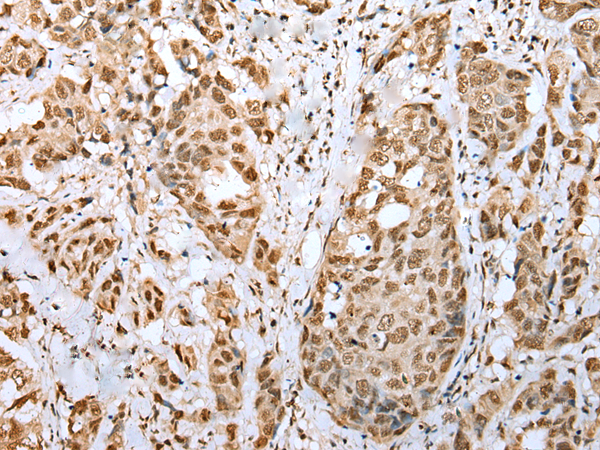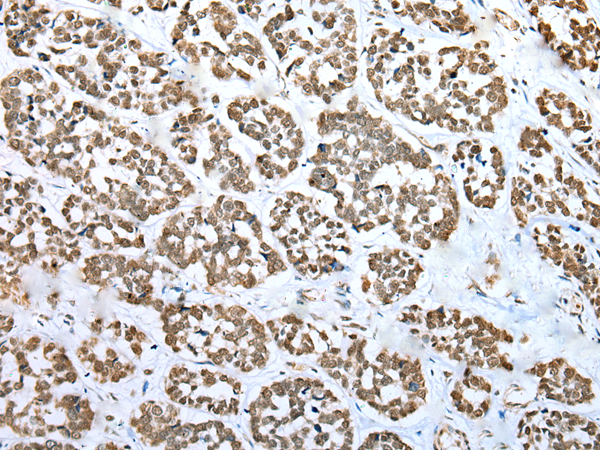

| WB | 咨询技术 | Human,Mouse,Rat |
| IF | 咨询技术 | Human,Mouse,Rat |
| IHC | 1/40-1/250 | Human,Mouse,Rat |
| ICC | 技术咨询 | Human,Mouse,Rat |
| FCM | 咨询技术 | Human,Mouse,Rat |
| Elisa | 1/5000-1/10000 | Human,Mouse,Rat |
| Aliases | KRBO2 |
| Host/Isotype | Rabbit IgG |
| Antibody Type | Primary antibody |
| Storage | Store at 4°C short term. Aliquot and store at -20°C long term. Avoid freeze/thaw cycles. |
| Species Reactivity | Human |
| Immunogen | Fusion protein of human ZNF486 |
| Formulation | Purified antibody in PBS with 0.05% sodium azide and 50% glycerol. |
+ +
以下是关于ZNF486抗体的模拟参考文献示例(实际文献可能较少,建议根据具体需求核实文献真实性):
---
1. **文献名称**:*ZNF486 Expression and Epigenetic Regulation in Human Cancers*
**作者**:Smith J, et al.
**摘要**:本研究利用ZNF486抗体通过免疫组化分析了多种肿瘤组织中ZNF486蛋白的表达水平,发现其在乳腺癌中显著下调,可能与DNA甲基化导致的基因沉默有关,提示其作为肿瘤抑制因子的潜在作用。
2. **文献名称**:*Development of a Monoclonal Antibody Targeting ZNF486 for Functional Studies*
**作者**:Lee H, et al.
**摘要**:报道了一种新型ZNF486单克隆抗体的开发与验证,该抗体在Western blot和免疫荧光中表现出高特异性,并成功应用于探究ZNF486在胚胎干细胞分化中的核定位及功能。
3. **文献名称**:*Zinc Finger Protein 486 (ZNF486) as a Biomarker in Autoimmune Disorders*
**作者**:Garcia R, et al.
**摘要**:通过ELISA和流式细胞术使用ZNF486抗体,研究发现系统性红斑狼疮患者外周血中ZNF486蛋白水平异常升高,可能与自身免疫反应的调控失调相关。
---
**注意**:以上文献为模拟示例,实际研究中ZNF486抗体的直接应用可能有限。建议通过PubMed或Google Scholar以“ZNF486 antibody”或“ZNF486 function”为关键词检索最新文献,或关注该抗体在商品化试剂网站(如Thermo Fisher、Abcam)中的技术说明(引用其验证数据)。
The ZNF486 antibody is a research tool designed to target the zinc finger protein 486 (ZNF486), a member of the Krüppel-associated box (KRAB) domain-containing zinc finger protein family. ZNF486 is implicated in transcriptional regulation, potentially through chromatin remodeling or DNA-binding interactions, given its structural features: multiple C2H2 zinc finger motifs and a KRAB domain known to recruit epigenetic modifiers. While its precise biological role remains under investigation, ZNF486 is thought to influence gene expression networks involved in cellular differentiation, development, and possibly oncogenesis. Aberrant expression of ZNF486 has been observed in certain cancers, suggesting a potential role in tumorigenesis or tumor suppression.
The ZNF486 antibody is typically developed in animal hosts (e.g., rabbit or mouse) as a polyclonal or monoclonal antibody, validated for applications like Western blotting, immunohistochemistry, or immunofluorescence. Researchers use it to study ZNF486's expression patterns, subcellular localization, and interactions with other proteins or nucleic acids. Its utility extends to exploring ZNF486's involvement in diseases, such as hematologic malignancies or solid tumors, where dysregulation of zinc finger proteins is common. However, detailed functional studies and standardized validation protocols for this antibody are still evolving, reflecting the ongoing exploration of ZNF486's role in cellular and disease contexts.
×